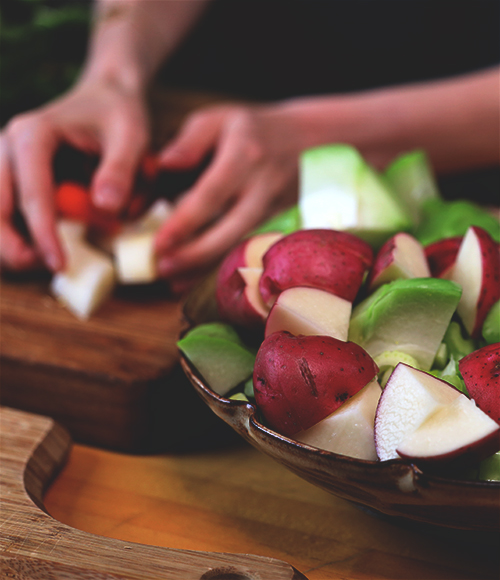5 Dietary Tips for Postpartum Recovery

Ideally, it is recommended to spend 40 days at home to help your body repair from the 10 months being pregnant, followed by labor and delivery. Many cultures offer support to the postpartum mother during this time by providing physical support through nourishing meals, as well emotional support to help guide the mother with the transition into motherhood. However, in our society we often do not have the support from friends or family that we need and are often left wondering how we should best care for ourselves
We have outlined 5 pillars of nutritional health to help keep your body and mind on a healthy trajectory when recovering on your postpartum journey. You may need to reach outside of your comfort zone and eat different kinds of meals during this season of your life. For example, my diet often includes smoothies, salads, etc., and is significantly plant-based, however; during the postpartum period, I ate mainly warm porridges and stews that often contained animal proteins. If you are breastfeeding, you will also have to significantly increase your caloric intake by about 450-500 more calories a day from regular consumption. Most likely, you will feel the increase in appetite, which well help you appropriately respond to your body’s needs. Your nutritional intake has never been more important.
Warm Digestible Foods:
When foods are served warm, they are more easily digestible and you’ll receive an increased amount of the nutritional value from the foods. Your digestion will be challenged after giving birth and will thank you for serving it more easily digestible meals. Soups and stews are also conveniently easy to make in big batches, with you can eat throughout the week or pull pre-prepared portions from your freezer. Examples of dishes include Caldo de Gallina, atole, chills or porridges.
Collagen & Protein:
Collagen can help build stronger hair and nails, increase skin elasticity, replenish bone density and improve joint health. The foods with the most abundant amounts of collagen include bone broths, stew meats cooked with bones and fish with bones (such as sardines).
Hydration:
Mothers who breastfeed loose around 24 ounces of fluids a day through their milk output, so they require an increase in water intake to about 16 glasses a day. This can come in the form of foods, such as broth-based foods, water and electrolyte beverages. Serving yourself warm or room temperature water is recommended to help with the ease of digestion. Try adding goji and/or jujube (red dates) to hot water for added iron intake.
Anti-inflammatory Foods:
Provide the body with diverse whole foods which include proteins, plants, fruits, legumes, whole grains, nuts and seeds. Avoid processed foods, such as white flours and vegetable oils. Avoid trigger foods for inflammation, which could include gluten, dairy, sugar, or alcohol.
Supplements:
It is generally advised to continue taking prenatal vitamins when breastfeeding to help with baby’s brain development and processing skills. In addition, iron supplementation is often recommended to help restore iron that was lost in blood during delivery. For easier absorption, iron can be taken in liquid form (such as Floradix) and be supported through liver pills. To help support bone health due to bone resorption when breastfeeding, calcium and vitamin D3/k2 can be beneficial. Moreover, fish oil with omega-3 is important for brain function and hormone balance. Arnica supplements can help with the perineal healing, but in small doses taken under the care of a healthcare provider. Red raspberry leaf tea can support uterine and pelvic muscle toning. There are also herbal supplements you can take under a trusted herbalist to help support breast milk production and postpartum health.




















Hello!! My name is Kelly
You will learn delicious and healthy recipes that you will want to share with your family! As a feeding therapist, I will also give you tips on how to adapt foods for younger eaters, while including gluten- and dairy-free, and plant-based options.